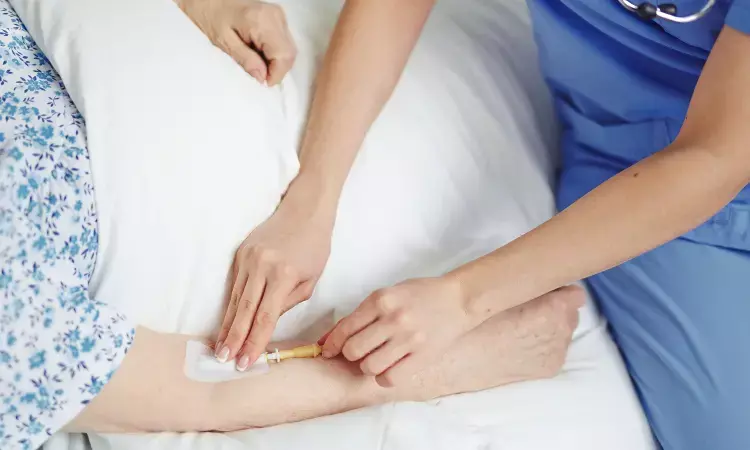- Home
- Medical news & Guidelines
- Anesthesiology
- Cardiology and CTVS
- Critical Care
- Dentistry
- Dermatology
- Diabetes and Endocrinology
- ENT
- Gastroenterology
- Medicine
- Nephrology
- Neurology
- Obstretics-Gynaecology
- Oncology
- Ophthalmology
- Orthopaedics
- Pediatrics-Neonatology
- Psychiatry
- Pulmonology
- Radiology
- Surgery
- Urology
- Laboratory Medicine
- Diet
- Nursing
- Paramedical
- Physiotherapy
- Health news
- Fact Check
- Bone Health Fact Check
- Brain Health Fact Check
- Cancer Related Fact Check
- Child Care Fact Check
- Dental and oral health fact check
- Diabetes and metabolic health fact check
- Diet and Nutrition Fact Check
- Eye and ENT Care Fact Check
- Fitness fact check
- Gut health fact check
- Heart health fact check
- Kidney health fact check
- Medical education fact check
- Men's health fact check
- Respiratory fact check
- Skin and hair care fact check
- Vaccine and Immunization fact check
- Women's health fact check
- AYUSH
- State News
- Andaman and Nicobar Islands
- Andhra Pradesh
- Arunachal Pradesh
- Assam
- Bihar
- Chandigarh
- Chattisgarh
- Dadra and Nagar Haveli
- Daman and Diu
- Delhi
- Goa
- Gujarat
- Haryana
- Himachal Pradesh
- Jammu & Kashmir
- Jharkhand
- Karnataka
- Kerala
- Ladakh
- Lakshadweep
- Madhya Pradesh
- Maharashtra
- Manipur
- Meghalaya
- Mizoram
- Nagaland
- Odisha
- Puducherry
- Punjab
- Rajasthan
- Sikkim
- Tamil Nadu
- Telangana
- Tripura
- Uttar Pradesh
- Uttrakhand
- West Bengal
- Medical Education
- Industry
Lidocaine infusions help relieve pain in unresponsive chronic migraine

Infusions of the local anesthetic lidocaine may provide some pain relief to people with chronic migraine that does not respond to other treatments, reports a study in the journal Regional Anesthesia & Pain Medicine.
Intravenous infusions of a local anesthetic such as lidocaine has been suggested as a possible treatment option for people who have a poor quality of life because of chronic migraine which is refractory to treatment. The aim is to 'break the cycle' of pain, but few studies have looked at the effectiveness of this treatment beyond immediate pain relief.
In this retrospective study, the authors analysed the hospital records of 609 patients who were admitted with refractory chronic migraine and treated with infusions of lidocaine to assess the short- and medium-term benefits of this approach. Patients included in the analysis had experienced at least 8 debilitating headache days per month for at least 6 months and failed to respond to or had contradictions to the seven classes of medicine for migraine.
Patients received lidocaine infusions over several days along with other aggressive drug treatments for migraine, such as ketorolac, magnesium, dihydroergotamine, methylprednisolone, and neuroleptics.
Most patients (87.8%) experienced rapid pain relief. At the time of admission, the median rating given by patients was 7.0 and this decreased to 1.0 by the time of hospital discharge.
Patients attending follow up appointments around one month after discharge also reported that the number of headache days that they experienced had fallen. The 266 patients who attended these appointments, which took place between 25 and 65 days after discharge, said that the number of headache days in the last month had fallen from a mean of 26.8 to 22.5.
Some patients experienced nausea and vomiting during the treatment but all adverse events experienced were mild.
This is an observational study, and as such, can't establish cause and the authors also highlight some limitations. Most importantly, not all patients completed follow-up visits, but they add that in their experience these were likely to be patients who responded well. In addition, some patients were included in the analysis more than once because they were admitted on multiple occasions, and while unlikely, it is possible, that hospitalisation itself could have contributed to pain relief.
The authors conclude, "Continuous lidocaine infusions were associated with improvement in acute pain in most patients and a decrease in both average pain and the number of headache days per month that extended out to 1 month. Most patients were acute responders, 43% of whom maintained improvement at 1 month and were sustained responders."
They add, "Lidocaine may be a viable treatment option for patients with refractory chronic migraine who have failed other treatments. A prospective, randomized, double-blind trial is needed to confirm these results."
For more information, check out the following link:
Dr Kamal Kant Kohli-MBBS, DTCD- a chest specialist with more than 30 years of practice and a flair for writing clinical articles, Dr Kamal Kant Kohli joined Medical Dialogues as a Chief Editor of Medical News. Besides writing articles, as an editor, he proofreads and verifies all the medical content published on Medical Dialogues including those coming from journals, studies,medical conferences,guidelines etc. Email: drkohli@medicaldialogues.in. Contact no. 011-43720751


